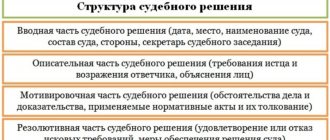Very often, participants in the process expect that a court decision in a civil case will completely stop further litigation and disputes. Lawyers will say that this situation is extremely rare. More often than not, the decision will be followed by an appeal. No less time and emotional costs are encountered in enforcement proceedings.
Nevertheless, the court decision in a civil case remains the most important procedural outcome and document. The requirements for the document and its content are regulated by Chapter 16 of the Code of Civil Procedure of the Russian Federation; we have disclosed the main nuances below. Let us remind you that additional information can be obtained from the duty lawyer.
When is a court decision made in a civil case?
After filing a claim and accepting it by the court, a civil case is prepared and a preliminary court hearing is held. The court makes a decision in a civil case at the main court hearing. But only if there are no grounds to terminate the proceedings or leave the application without consideration.
Thus, the court decision is the final document. Which resolves the case on its merits. The court makes a decision whether to satisfy the plaintiff’s claims in whole or in part. Or maybe refuse satisfaction. Or establish a fact of legal significance. In cases of issuing a court order, the court does not make a decision. He is issued a court order.
The court's decision must be legal and justified. What do these concepts include?
We've sorted out the deadlines, but how to win an appeal?
Most likely you are reading this article because you do not have a legal education. And you probably already lost the case in the first instance. There are still chances to win, but with each next step they become less and less (all possible authorities are written here). Don’t skimp on lawyers – your mistakes will cost more.
Lawyer Vladimir Chikin is always ready to help you - provide advice, prepare procedural documents and protect your interests in court. Write to or call: +7 (499) 390 76 96.
Legality and validity of a court decision in a civil case
Surprisingly, in the past, court decisions were often overturned due to violation of the requirements for the procedure for making them. The Code of Civil Procedure of the Russian Federation establishes that after the judicial debate, the court retires to the deliberation room. In practice, all participants in the case, as well as the secretary, are removed from the judge’s office and await the announcement of the decision. The presence of other persons in the deliberation room is not permitted.
In its decision, the court is obliged to evaluate the evidence in a civil case presented by the participants, as well as received as part of the request for evidence and letters rogatory. In the decision, he will determine which circumstances are established and which are not. What legal relations govern the relationship between the parties to the case. Is the claim subject to satisfaction?
In most civil cases, the court is bound by the plaintiff's demands. That is, the subject, grounds of claim and amount of the claim. But in some cases (for example, in a claim for divorce, the court has the right, but not the obligation, to also resolve issues of collecting alimony and determining the child’s place of residence), the court is not bound by the plaintiff’s demands. It is possible to go beyond the limits only if such a possibility is provided for by federal laws.
Commentary on Article 194 of the Code of Civil Procedure of the Russian Federation
1. In the process of considering civil cases, the justice body resolves various issues, which is the implementation of judicial power. Externally, the latter is expressed in judicial acts, which are generally called judicial decisions. Depending on the content of the issue being resolved, in accordance with civil procedural legislation, the court of first instance issues decisions of three types: decisions, court orders and determinations (Article 13 of the Code of Civil Procedure of the Russian Federation).
The decision of the court of first instance, which resolves the case on its merits, is issued in the name of the Russian Federation in the form of a decision (Part 1 of Article 194 of the Code of Civil Procedure of the Russian Federation).
Rulings can formalize the court's resolution of a variety of procedural issues that arise in the course of the administration of justice (for example, when preparing a case for trial, when postponing trial, when replacing an inappropriate defendant with a proper one, when securing a claim, terminating proceedings, etc. .).
A special type of court decision (judicial act) is a court order, which by its legal nature cannot be equated to a court decision and determination, since it is not decided regarding the adversarial resolution of a civil case or its individual issues. A court order refers to executive documents and is issued without filing a claim, initiating civil proceedings or trial (see Article 12 of the Federal Law “On Enforcement Proceedings” and commentary on Chapter 11).
A common feature of a court decision, court order and determination is that they all contain an expression of the will of the state represented by the court.
The difference between a court decision and a determination is as follows:
— justice is administered through a court decision, i.e. a subjective substantive right or legally protected interest is protected. The definition as a judicial act does not affect the substance of the case;
- a court decision is the final judicial act in the court of first instance, which always ends the judicial consideration of the case.
As an exception, legal proceedings in the court of first instance end with a ruling, not a decision (see comments to Articles 220 and 222).
For each case, the court must make one decision. However, the legislation provides for the possibility of the court making so-called interim decisions. For example, if, when considering a civil claim in a criminal proceeding, it is difficult to calculate the amount to be recovered under such a claim, without postponing the criminal proceedings or without obtaining additional materials, the court may recognize the right of the victim (civil plaintiff) to satisfy the claim and transfer it to the appropriate court to determine the amount of the sought claim in civil proceedings.
The verdict in this case, in terms of recognition of the victim’s right to satisfy the claim, is an interim decision. An interim decision can be made by the court when considering a case for compensation for damage in connection with damage to the health of a person who has not reached the age of majority (Article 1087 of the Civil Code of the Russian Federation).
A judicial decision is an important act of justice, therefore the legislator sets clear requirements for the procedure for making a decision, its content and form.
2. The court decision is made in the deliberation room. This requirement must be strictly observed, since violation of the secrecy of a meeting of judges is an absolute basis for canceling a decision (clause 7, part 4, article 330 of the Code of Civil Procedure of the Russian Federation). Noteworthy is the slightly different approach of the APC to the issue of the procedure for making a decision by the arbitration court. So, in accordance with Part 3 of Art. 167 of the APC, the decision is made by judges participating in the court session under conditions that ensure the secrecy of the meeting of judges. Consequently, arbitration courts do not require a separate specially equipped room. But, just as in courts of general jurisdiction, the secrecy of the meeting of judges is guaranteed by the obligation of judges to maintain the secrecy of the discussions that took place when making a decision.
In accordance with Part 3 of Art. 194 of the Code of Civil Procedure of the Russian Federation, judges cannot disclose opinions expressed during the meeting.
In the theory of civil procedural law, the opinion was expressed that violation of the secrecy of a meeting of judges should entail the reversal of a court decision if this violation occurred during its adoption. If, after the decision was made, judgments that took place at the time the decision was made were disclosed, the grounds for canceling the decision do not apply, since “there can be no talk of any influence on the will of the judges and the independence of the judges was ensured at the time the decision was made” <1>. ——————————— <1> See: Commentary on the Civil Procedure Code of the RSFSR: Scientific and practical. a comment. M., 2001. P. 411.
It seems that in this case one should be guided by Part 3 of Art. 194 of the Code of Civil Procedure of the Russian Federation, according to which “...judges cannot disclose judgments expressed during the meeting.” There is no doubt that the above wording, which contains a categorical requirement to keep secret the opinions expressed in the deliberation room regarding the decision being made, also applies to the time after its announcement.
3. A collegial meeting of judges takes place in the manner prescribed by Art. 15 Civil Procedure Code.
Court decision in a civil case: contents
All court decisions are similar in content and include the following parts:
- introductory part: date and place of the decision, name of the court, composition of the court, which secretary, case number, who were the parties, other persons participating in the case, representatives, subject of the dispute or stated claim
- descriptive: claims of the plaintiff, objections of the defendant, brief arguments for responding to the claim or filing a counterclaim, explanations of other persons
- motivational: the circumstances established by the court and the examined evidence about such circumstances, the arguments on which certain evidence is rejected, references to regulations (laws) that guided the court when making a decision. If the claim has been admitted, the claim has been waived due to the rejection of the application to restore the statute of limitations or the procedural period for filing a lawsuit, the reasoning part contains only such circumstances
- resolutive: final decision. Satisfy the plaintiff’s demands, refuse, in whole or in part, the distribution of legal costs, the deadline and procedure for filing an appeal.
This is the full decision of the court. At the hearing, the court usually only reads the introductory and operative parts. And the secretary will deliver the full decision before the expiration of 5 working days. Please note that the magistrate's court and the judge in a summary proceeding case may limit themselves to a decision without a reasoning part. To receive a full decision, you must prepare and submit an application.
Five days later the decision was not issued...
After the decision has been announced, the judge may warn that there is no need to rush to get a copy. But this does not change the fact that the deadline for producing a complete solution in final form is the same for everyone, there are no exceptions.
Therefore, after the expiration of the five-day period, you have the right to submit a written application for the issuance of a court decision. You will either be given a copy of the judicial act within five working days, or you will not be given a copy. In the latter case, you can submit a new application, indicating that the first one was not executed by the court and the deadlines were violated. If there is a fair amount of delay, it is advisable to complain to the leadership of the court.
By these actions you will record the fact of a violation of the deadline for preparing a reasoned decision, which will serve as a justification for later granting a request to restore the missed deadline for appeal.
Service of a court decision in a civil case
So, the decision is announced at the court hearing immediately after it is made. But only the operative part of it. The motivation letter is usually drawn up later. But no more than 5 days from the date of the end of the trial.
After announcing the operative part of the decision, the court has no right to cancel or change it. If errors are found, you can file an application with the court to correct clerical errors or obvious arithmetic errors. When errors are discovered in the application of substantive or procedural rules, an appeal is filed.
The court decision comes into force one month after its issuance, unless the request for immediate execution is satisfied. Or such immediate execution is provided for by the Code of Civil Procedure of the Russian Federation.
The parties may apply for clarification of the court decision in a civil case, for an additional decision, or for changing the method and (or) order of execution.
When should the decision be issued in final form?
If the entire text is announced at the meeting, you can immediately apply for a copy to be made for you. They will issue it either immediately or within five working days.
But, as already mentioned, most likely at the meeting you will only hear the operative part. In this case, the judge is obliged to explain to the parties when the decision will appear in full. The protocol must contain a mention of such clarification.
Then you will wait. The judge has only five days to fully prepare his decision. The magistrate may not draw up a reasoned decision unless the parties ask him to do so. But if asked, it is also limited to five days.








